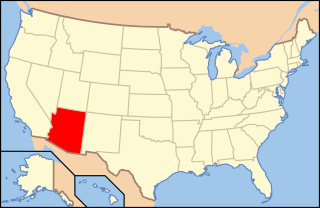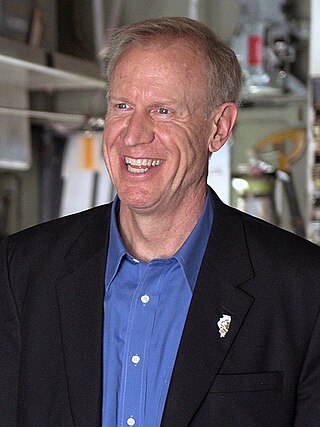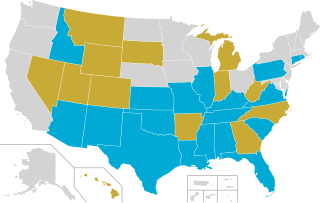
Samuel Dale Brownback is an American attorney, politician, and diplomat who served as a United States senator from Kansas from 1996 to 2011 and as the 46th governor of Kansas from 2011 to 2018. A member of the Republican Party, Brownback also served as the United States Ambassador-at-Large for International Religious Freedom during the administration of President Donald Trump and was a candidate for the Republican nomination for President in 2008.
The Alliance Defending Freedom (ADF), formerly the Alliance Defense Fund, is an American conservative Christian legal advocacy group that works to expand Christian religious liberties and practices within public schools and in government, outlaw abortion, and oppose LGBTQ rights. ADF is headquartered in Scottsdale, Arizona, with branch offices in several locations including Washington, D.C., and New York. Its international subsidiary, Alliance Defending Freedom International, with headquarters in Vienna, Austria, operates in over 100 countries.

The rights of lesbian, gay, bisexual, and transgender (LGBT) people in the U.S. state of Utah have significantly evolved in the 21st century. Protective laws have become increasingly enacted since 2014, despite the state's reputation as socially conservative and highly religious. Utah's anti-sodomy law was invalidated in 2003 by Lawrence v. Texas, and fully repealed by the state legislature in 2019. Same-sex marriage has been legal since the state's ban was ruled unconstitutional by federal courts in 2014. In addition, statewide anti-discrimination laws now cover sexual orientation and gender identity in employment and housing, and the use of conversion therapy on minors is prohibited. In spite of this, there are still a few differences between the treatment of LGBT people and the rest of the population, and the rights of transgender youth are restricted.

Janice Kay Brewer is an American politician and author who served as the 22nd governor of Arizona from 2009 to 2015. A member of the Republican Party, Brewer is the fourth woman to be Governor of Arizona. Brewer assumed the governorship as part of the line of succession, as determined by the Arizona Constitution, when Governor Janet Napolitano resigned to become U.S. Secretary of Homeland Security. Brewer had been Secretary of State of Arizona from January 2003 to January 2009.

Steve Michael Gallardo is an American politician from the state of Arizona. A member of the Democratic Party, Gallardo serves on the Maricopa County Board of Supervisors representing the 5th district. He previously served in the Arizona State Senate, representing the 13th district from 2011 through 2015 and in the Arizona House of Representatives from 2003 through 2009.
Same-sex marriage has been legal in Arizona since October 17, 2014. The U.S. state had denied marriage rights to same-sex couples by statute since 1996 and by an amendment to its State Constitution approved by voters in 2008. On October 17, Judge John W. Sedwick ruled in two lawsuits that Arizona's ban on same-sex marriage was unconstitutional, and enjoined the state from enforcing its ban, effective immediately. Attorney General Tom Horne said the state would not appeal that ruling, and instructed county clerks to comply and issue marriage licenses to same-sex couples.

The Support Our Law Enforcement and Safe Neighborhoods Act is a 2010 legislative Act in the U.S. state of Arizona that was the broadest and strictest anti-illegal immigration law in the United States when passed. It has received international attention and has spurred considerable controversy.

Lesbian, gay, bisexual, and transgender (LGBT) people in the U.S. state of Arizona may face legal challenges not experienced by non-LGBT residents. Same-sex sexual activity is legal in Arizona, and same-sex couples are able to marry and adopt. Nevertheless, the state provides only limited protections against discrimination on the basis of sexual orientation and gender identity. Several cities, including Phoenix and Tucson, have enacted ordinances to protect LGBT people from unfair discrimination in employment, housing and public accommodations.

Michele Reagan is an American Republican politician who served as the 20th Arizona Secretary of State, from 2015 to 2019. She is currently a Justice of the Peace for the Maricopa County McDowell Mountain Precinct.

Bruce Vincent Rauner is an American businessman, philanthropist, and politician who served as the 42nd governor of Illinois from 2015 to 2019. A member of the Republican Party, he previously served as the chairman of R8 Capital Partners and chairman of the Chicago-based private equity firm GTCR.

Bob Worsley is an American businessman and politician. He is the founder of SkyMall and a former Republican member of the Arizona Senate representing District 25 from 2013 to 2019.

State Religious Freedom Restoration Acts are state laws based on the Religious Freedom Restoration Act (RFRA), a federal law that was passed almost unanimously by the U.S. Congress in 1993 and signed into law by President Bill Clinton. The laws mandate that religious liberty of individuals can only be limited by the "least restrictive means of furthering a compelling government interest". Originally, the federal law was intended to apply to federal, state, and local governments. In 1997, the U.S. Supreme Court in City of Boerne v. Flores held that the Religious Freedom Restoration Act only applies to the federal government but not states and other local municipalities within them. As a result, 21 states have passed their own RFRAs that apply to their individual state and local governments.

Steven B. Yarbrough is an American politician. A Republican, he was the president of the Arizona Senate, and represented District 17 from January 14, 2013 to January 14, 2019. Yarbrough served in the Arizona State Legislature from January 2003 until January 2011 in the Arizona House of Representatives District 21 seat, then in the Arizona Senate in the District 21 seat from January 10, 2011 until January 14, 2013 for his first term in the Senate. This District was renumbered from 21 to 17 in 2012, although it remained substantially the same geographically.
Arizona SB 1062 was an Arizona bill to amend an existing law to give any individual or legal entity an exemption from any state law if it substantially burdened their exercise of religion, including Arizona law requiring public accommodation.
Virginia House Bill 1414 was a proposed legislation introduced into the Virginia General Assembly on January 14, 2015, by Bob Marshall. The bill didn't pass. The bill would have enabled refusal of service to persons based on "same-sex "marriage" or homosexual behavior" by any public or private business in some way licensed by the state. Critics suggest that the law, if enacted, could be used by hospitals to turn away patients, restaurants to refuse to serve and to remove students from school and compared it to Jim Crow laws. The Virginia Christian Alliance emphasized their position that the bill is critical to clergy and that they "fear for their job" should the bill fail.
Indiana Senate Bill 101, titled the Religious Freedom Restoration Act (RFRA), is a law in the U.S. state of Indiana, which allows individuals and companies to assert as a defense in legal proceedings that their exercise of religion has been, or is likely to be, substantially burdened.
The United States presidential candidates in the 2016 United States presidential candidates by political affiliation hold a wide variety of stances on issues related to domestic and foreign policy and their political ideological views.

Robert Onder Jr. is an American politician and physician from the state of Missouri. A Republican, he was a member of the Missouri Senate from 2015 to 2022, serving the 2nd District in the St. Charles area. He was elected Assistant Majority Floor Leader in 2015. Onder previously was a member of the Missouri House of Representatives from 2007 to 2008.

The Fifty-eighth Oklahoma Legislature was a meeting of the legislative branch of the government of Oklahoma, composed of the Senate and the House of Representatives. It met in Oklahoma City, Oklahoma from January 3, 2021, to January 3, 2023, during the second two years of the first administration of Governor Kevin Stitt. The 2020 Oklahoma elections maintained Republican control of both the House and Senate.













